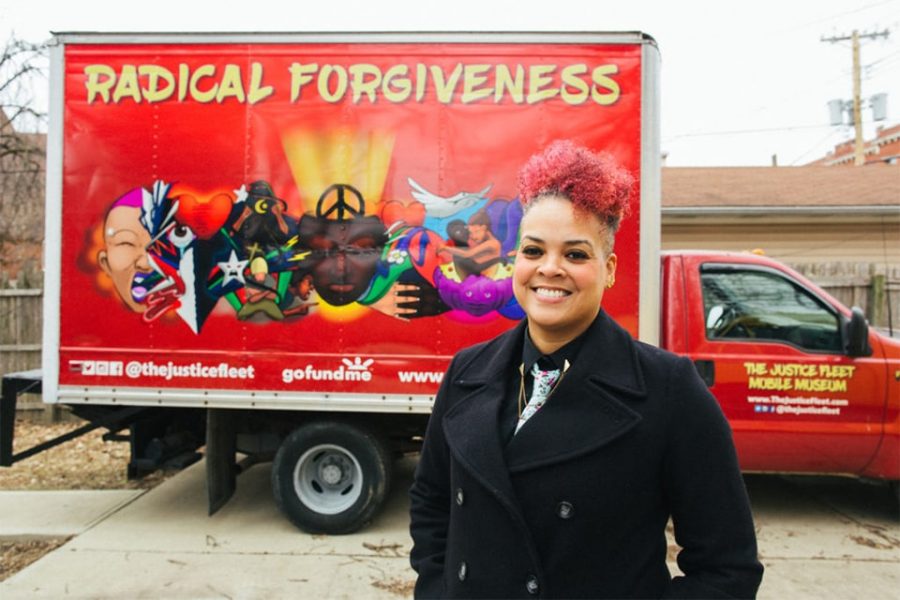Driving for Justice
What started as an old delivery truck has grown into a network of four “mobile museums” with the mission of driving the conversation surrounding culture, race and identity. These mobile museums, dubbed The Justice Fleet, “foster healing through art, dialogue, and play,” said Amber Johnson, Ph.D., associate professor of communication at SLU and founder of the Justice Fleet.
“Once you are aware of how social injustice impacts specific people, communities and institutions, it is hard to sit and do nothing” they said.
Johnson works to inspire others both inside and outside the classroom as a scholar, artist and activist. They are also very active in their research on art activism and social justice—in which the idea for the Justice Fleet was developed.
The first truck features the theme of “Radical Forgiveness,” by uniting art activism with social justice. Participants in the exhibit are encouraged to heal through painting a message of forgiveness onto the Forgiveness Quilt. Johnson has been constructing Forgiveness Quilts for over a decade in the classroom as a visual display of liberation from the pain and guilt suffered in social inequity.
“Our mission is simple and universal. There are inequities on every single country on this planet and if we’re going to attempt to fix these inequities we also have to also heal from them, they have to happen at same time,” Johnson said.
Each Justice Fleet truck embodies its own theme surrounding social justice through interactive and creative outlets like paint, toys, legos and even a ball pit. By bringing their message to communities around the country, Johnson hopes to counter the notion that “humans have forgotten how to play and how to imagine.”
“We are constantly in community. We are always working with community members from different marginalized spaces with different traumas and different inequities,” Johnson said.
These tools are intended to initiate healing from injustices as well as build solutions, with the goal being to reflect, engage and apply forgiveness to our prejudices and biases.
Johnson recounts the inspiration they had for the project when they began teaching at SLU in 2015, when Darren Wilson was found innocent after the shooting of Michael Brown Jr. “My students said to me that there’s so much happening and people need healing. You can’t just do this in the classroom. This was how Radical Forgiveness and Injustice Fleet was born,” said Johnson.
Another exhibit named “Transfuturism” celebrates gender embodiment through telling the story of black transgender and nonbinary people. After interviewing and photographing them, Johnson digitally projects the participants as superheros. These pieces of art break down gender and race barriers, and instead lifting participants up.
“I am making the argument that trans and nonbinary people do that in the flesh right now. That you can see evidence of that liberating yourself from the gender binary. You don’t have to speculate it or wait for it in this future horizon, but it’s already happening, that is why we turn them into superheros,” they said.
Radical Imagination, the third exhibit, has “popped up” in various communities more than forty times just this year. This exhibit builds upon the empowerment of both Radical Forgiveness and Transfuturism to engage participants in an experiential learning activity in which they create the world they want to live using a hodgepodge of crafts and art supplies, encouraging an open dialogue about the social injustices and corruption structures that our world is built upon.
Radical Forgiveness, Transfuturism and Radical Imagination have already impacted thousands of people and communities around the world, but the Justice Fleet is not stepping on the brakes just yet. Their up and coming exhibit dubbed Black Girl Magic will explore the oppression suffered by Black girls, women and femmes with the goal of humanizing and empowering them. Johnson is also currently developing two other projects to be launched in the fall: a grief garden to provide a safe space for those suffering from communal traumas, as well as The Institute for Healing Justice and Racial Equity which will be located on SLU’s campus.
Johnson looks forward to the promising future.“Eventually I would even love to give people enough money to build their own exhibits for the Justice Fleet,” they said.
“The world needs things like forgiveness, we need things like imagination,” Johnson said. “We need things to celebrate who we are and what our identities mean to us and those we are connected to.”
Your donation will support the student journalists of Saint Louis University.


